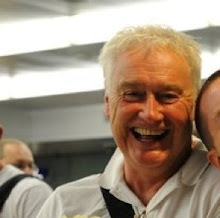
'Up a steep and very narrow stairway, to a voice like a metronome' ... well strictly that's 'A Chorus Line' but it could apply to almost any show in the airless attic that is the Finborough Theatre and particularly to Charlotte Randle's shouty performance as an English teacher in 'Lingua Franca'.
I'm sure she's a subtle and sensitive actress, but veteran Peter Nichols' new play doesn't give her free rein to express it as he confines all his characters trapped in a Florentine language school in the 50's to one-dimensional stereotypes: particularly Rula Lenska visibly straining to add a sophistication and depth to her flatly-written Russian emigre countess, Abigail McKern's hard-workingly crude but ultimately uncomical Aussie lesbian, and perhaps most wasted Natalie Walter as a Nazi-sympathising Mädchen just two telephone plaits short of Helga from 'Allo 'Allo.
What saves the production from the scrapheap is the two semi-autobiographical characterisations: Ian Gelder as an ageing monolingual aesthete who turns to sculpture as a substitute for sex, and Chris New playing Steven Flowers now transplanted from soldiering in Malaya in 'Privates on Parade' and with a burgeoning socialist conscience fighting a complicated provincial diffidence.
It's as if Nichols is interested only in developing these two characters as projections of his own self, and that the others are disposable caricatures. It's how all self-centred people see the world and consistent with Benedict Nightingale's review of Nichols' 2000 autobiography in which he found the writer 'touchy, crusty' and 'disappointed with himself'. Gelder has the best material and gives a careful and considered performance, highlighting the fact this intelligent actor is sadly underused.
Apart from one bizarre scene in which the Italian school manager puts his head up the skirt of the German girl in a realistic display of what you could call cunnilingua franca, the play is terribly static, imprisoned in one room of the language school with only scruffy louvres hinting at windows in the low-budget set, although Will Jackson's sound brings cicadas, street noise and music to colour the space, and James Smith's lighting design occasionally projects Florence in all her glory across the blind windows.
Every teacher's entrance seems to be marked by a rummage in bag or briefcase, the extraction of a book or journal which is never read or used, and its careful replacement or repositioning for use by another actor. There are too many monologues and limited interaction since they are such ciphers, so the emotional climax when two women vie for Flowers' attention is unrealistic, and when the German gets stabbed in the eye the quickly-produced eyepatch just begs for her to sit astride a chair and sing Marlene's back catalogue.
What makes it all worth the effort, though, is the opportunity to see at close hand the work of Chris New. Since graduating from RADA in 2006 he has been the most perfect foil of 'Horst' to Alan Cumming's 'Max' in the Daniel Sherman production of 'Bent' before taking a storming lead himself as Joe Orton in 'Prick Up Your Ears'.
As Flowers, he is the ideal suburban Everyman of Nichols' imagination, combining pathos, humour and inner confliction in a performance of subtlety and understanding which makes the audience impatient for his next entrance. In his vocal delivery, he could be the new Leonard Rossiter and I suspect his comic potential has only slightly been tested to date. He has a very confident singing voice, too, which suggests an option to revive Privates.
He's clearly got a sense of humour because he tweeted the excerpt from Billington's Guardian review which referred to 'the sexiest seduction scene on the West End stage' with "Crow, Crow! ... who says gays cant pull off being straight!??"
Perhaps Lingua Franca would work better as a musical comedy, it's not so great as a, er, straight play.




No comments:
Post a Comment